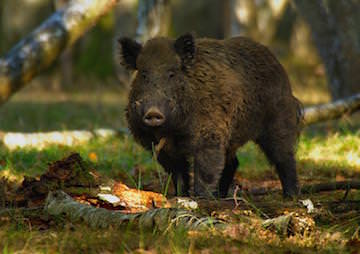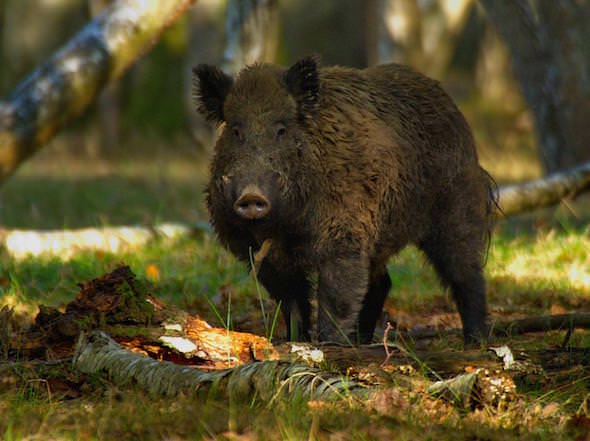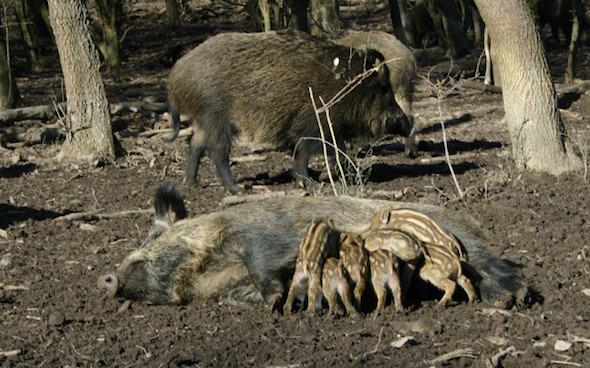European Warming Sends Wild Boar Numbers Soaring
Increasingly mild winters and an abundance of acorns and nuts have caused a population explosion among wild boar in Europe.
By Paul Brown, Climate News Network

In France, wild boar are spreading from their woodland habitat and are now a major cause of traffic accidents. (Philippe Rouzet via Flickr)
This Creative Commons-licensed piece first appeared at Climate News Network.
LONDON — Wild boar populations in Europe are getting out of control — and scientists are blaming climate change.
There are now millions of wild boar spreading out from their preferred woodland habitat, moving into city suburbs, and even crossing national boundaries to countries that had thought they were extinct.
In some countries, notably France and Germany, which have always had wild boar populations in their forests, they are a major cause of road accidents.
France has an estimated two million boar, and the German state of Hesse alone has 180,000. Berlin, the German capital, is erecting boar fencing around its borders in an attempt to keep the animals out of the city.
Extra production
The scientists believe that the increasingly frequent mild winters in Europe and the extra production of acorns and beechnuts by trees are aiding boar survival rates. Both factors are the result of climate change, they say.
Scientists from the Research Institute for Wildlife Ecology at the University of Veterinary Medicine in Vienna, Austria, report in the journal PLOS ONE that they chose the animal to study because “the wild boar has an enormous reproductive capacity, and thus the potential for remarkable population growth when environmental conditions become more favourable”.
Wild boar can have five or more young in a litter, and females can reach sexual maturity within their first year if there is enough food available.
The number of animals has been increasing since the 1980s. Because boars are secretive, nocturnal animals, the scientists had to use hunting records and road accidents to help count the animals in 12 European countries.
“The wild boar has the potential for remarkable population growth when environmental conditions become more favourable”
“Doing this, we were able to depict the growth of the wild boar population,” says the report’s lead author, Sebastian Vetter, an evolutionary biologist. “As mild winters are becoming more frequent, boar populations are also growing exponentially.”
 Wild boar can have five or more young in a litter. Image: Sebastian Vetter/Vetmeduni Vienna
Wild boar can have five or more young in a litter. Image: Sebastian Vetter/Vetmeduni Vienna
Climate change is also having a direct effect on food supply, the authors say, with the “mast years” — years when trees produce huge quantities of acorns and nuts — also aiding the animals’ survival.
In severe winters, a large number of young from the previous summer used to die of cold and hunger, but the extra food supply available, even in cold spells, is enabling more to survive.
Survival rate
Wild boars are one of the most widely distributed of animals, with their numbers varying between northern and southern latitudes. However, the survival rate of boar populations in Europe seems to be increasing across all countries.
One of the reasons for the wider spread of boar populations has been the fashion for their meat. Wild boar farms have been established in countries where the species had long ago been hunted to extinction. But farmers, unfamiliar with the animals, were not prepared for their ability to break down or jump fences as high as two metres, and many boars escaped into the wild.
Sweden, for example, had no wild boar 10 years ago, but now has an estimated 150,000 in its forests. The UK also has a boar population for the first time in 500 years.
Italy, well to the south, has always had wild boar, but has also seen a huge growth in their numbers. There are now estimated to be between 600,000 and one million animals. Some are seen on the outskirts of Rome, Genoa and Naples, where they eat from dustbins.
Your support matters…Independent journalism is under threat and overshadowed by heavily funded mainstream media.
You can help level the playing field. Become a member.
Your tax-deductible contribution keeps us digging beneath the headlines to give you thought-provoking, investigative reporting and analysis that unearths what's really happening- without compromise.
Give today to support our courageous, independent journalists.






You need to be a supporter to comment.
There are currently no responses to this article.
Be the first to respond.